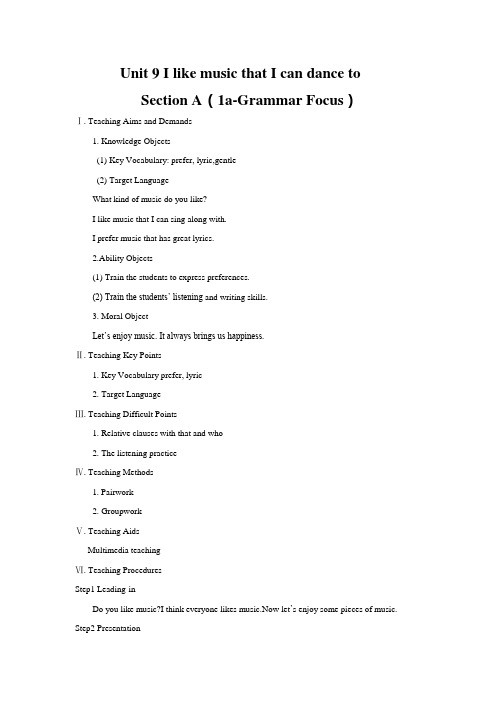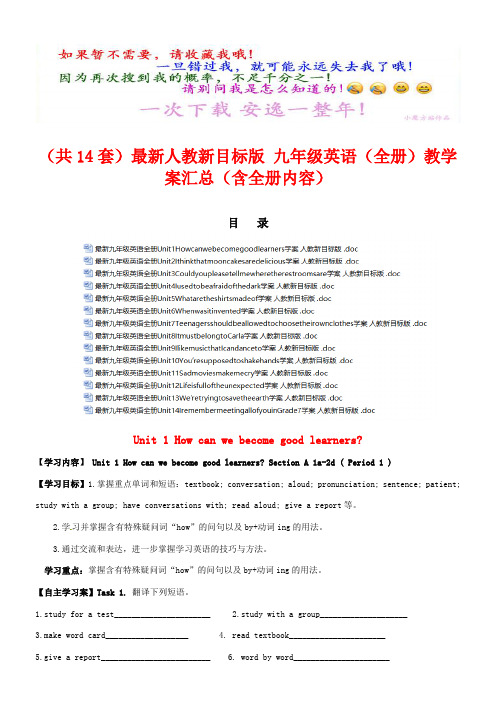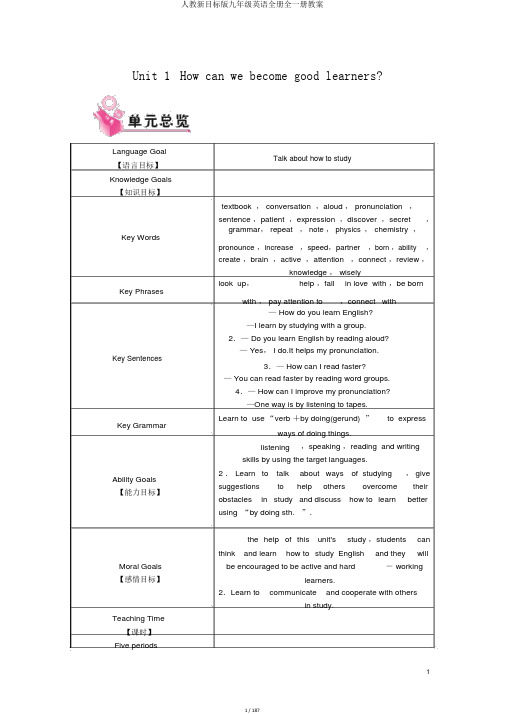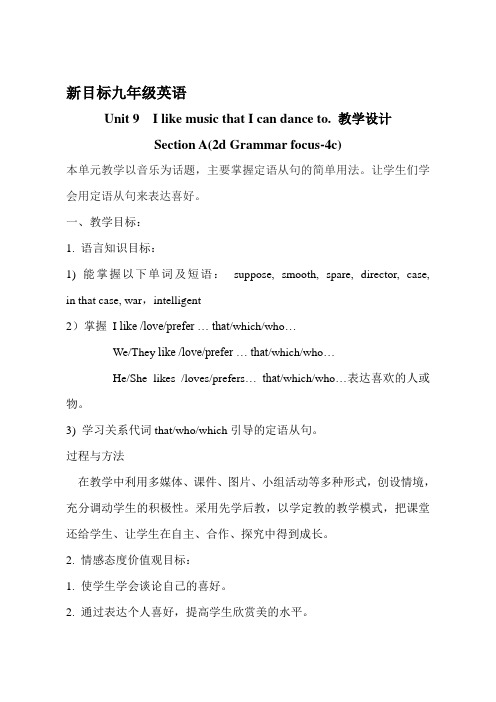【精品】【人教新目标版】初中英语9九年级全册 教案(新教材)
(完整版)人教版新目标初中九年级英语全册教案

(完整版)人教版新目标初中九年级英语全册教案-CAL-FENGHAI-(2020YEAR-YICAI)_JINGBIANUnit 3 Teenagers should be allowed to choose their own clothes.Section AThe Third PeriodTarget language:A: What rules do you have at home?B: Well, I'm not allowed to go out on school nights. How about you?A: I'm not allowed to go out on school nights either. But I can study at a friend's house.教学难点Talk about agreement and disagreement.教学内容及教师活动学生活动设计意图Step 1 RevisionCompetition: Write “are allowed to” and “aren't allowed to” on the blackboard. Divide the class into groups.Each group is asked to write down as many things as they can think of about what teenagers are or aren't allowed to do. See which group can think of the most items for each category.Step 2 PresentationI.1aThis activity reviews the use of always, sometimes, usually and never.Point to the picture. Ask students to describe what is happening in the picture.Help students to say, The boy is late for class. Invite a student to read the four questions in the box to the class.Read the instructions and remind students of the exact meanings of the adverbs of frequency. Work as theteacher says.Look at thepictures and saywhat is happeningin each picture.Students finishthe task on their激发学生兴趣,对所学知识进行复习,使记忆更加深刻。
人教新目标九年级英语全册教案:Unit9 教案

Unit 9 I like music that I can dance toSection A(1a-Grammar Focus)Ⅰ. Teaching Aims and Demands1. Knowledge Objects(1) Key Vocabulary: prefer, lyric,gentle(2) Target LanguageWhat kind of music do you like?I like music that I can sing along with.I prefer music that has great lyrics.2.Ability Objects(1) Train the students to express preferences.(2) Train the students’ listening and writing skills.3. Moral ObjectLet’s enjoy music. It always brings us happiness.Ⅱ. Teaching Key Points1. Key Vocabulary prefer, lyric2. Target LanguageⅢ. Teaching Difficult Points1. Relative clauses with that and who2. The listening practiceⅣ. Teaching Methods1. Pairwork2. GroupworkⅤ. Teaching AidsMultimedia teachingⅥ. Teaching ProceduresStep1 Leading-inDo you like music?I think everyone likes music.Now let’s enjoy some pieces of music.Step2 PresentationPlay a piece of music.Then ask the students:Do you like the music?What do you think ofit?Help the students to answer it.Then say , I like music that I can dance to.In this way,play some other kinds of music for the students and let them try to say “Ilike/prefer music that has great lyrics,…that I can sing along with,…that isn’t too loud, …”. Tell the students prefer means like …better.(设计意图:先描述对各种音乐的感觉,引导学生学会用定语从句表达自己喜欢的各种音乐。
(共14套)最新人教新目标版 九年级英语(全册)教学案汇总(含全册内容)(打包下载)

(共14套)最新人教新目标版九年级英语(全册)教学案汇总(含全册内容)目录Unit 1 How can we become good learners?【学习内容】Unit 1 How can we become good learners? Section A 1a-2d ( Period 1 )【学习目标】1.掌握重点单词和短语:textbook; conversation; aloud; pronunciation; sentence; patient; study with a group; have conversations with; read aloud; give a report等。
2.学习并掌握含有特殊疑问词“how”的问句以及by+动词ing的用法。
3.通过交流和表达,进一步掌握学习英语的技巧与方法。
学习重点:掌握含有特殊疑问词“how”的问句以及by+动词ing的用法。
【自主学习案】Task 1. 翻译下列短语。
1.study for a test______________________2.study with a group____________________3.make word card___________________4. read textbook______________________5.give a report_________________________6. word by word______________________7.大声朗读_________________________ 8.对话____________________________9.练习发音__________________________Task 2. I study for a test by____________________________________________I learn English by________________________________________________【合作学习案】e g. A: How do you study for s test? / learn English?B:I study for a test / learn English by...①—How do you study for a test? —I study by working with a group.②We usually go to school by bike.③English is spoken by many people.by的意思是“通过……的方式”时,后接;当表示“乘坐”时, 后跟;它还可以表示 , 用于被动语态,引导出动作的发出者。
人教新目标九年级英语全册Unit1SectionA(3a3b)优秀教学案例

2.培养学生团队合作的精神,让他们在交流中互相帮助,共同进步。
3.培养学生自主学习的能力,鼓励他们在课堂上主动提出问题,寻找答案。
4.通过讨论和交流,使学生意识到学习英语的重要性,提高他们对英语学习的价值观。
三、教学策略
(一)情景创设
1.通过呈现一位学生参加学校篮球比赛的案例,让学生身临其境地感受一般过去时的用法。
3.教师对学生的学习成果进行评价,关注他们在知识掌握和技能运用方面的进步。
4.通过课后作业和辅导,帮助学生巩固所学知识,提高他们的英语素养。
四、教学内容与过程
(一)导入新课
1.利用图片或视频展示一位学生参加学校篮球比赛的场景,引发学生的兴趣,激发他们对过去发生事情的好奇心。
2.提问学生:“Can you guess what happened yesterday?”,让学生尝试用英语描述过去的事情,为导入新课做铺垫。
2.问题导向:在本节课中,教师通过设置疑问句和否定句,引导学生观察和分析案例,发现一般过去时的用法。这种问题导向的教学策略,能够激发学生的思考能力,培养他们独立思考和解决问题的能力。
3.小组合作:教师组织学生进行小组讨论和角色扮演的任务,让学生在团队合作中共同探讨一般过去时的用法。这种小组合作的方式不仅能够提高学生的口语表达能力,还能够培养他们的团队合作能力和自主学习能力。
4.教师巡回指导,关注学生的讨论和创作过程,及时给予反馈和帮助。
(四)总结归纳
1.邀请学生分享他们在小组讨论中的成果,让其他同学一起学习和交流。
2.教师对学生的表现进行点评,总结一般过去时的用法和重要性。
3.通过问答方式,检查学生对一般过去时的理解和掌握程度。
人教新目标版九年级英语全册全一册教案

Unit 1 How can we become good learners?Language GoalTalk about how to study【语言目标】Knowledge Goals【知识目标】textbook , conversation ,aloud , pronunciation ,sentence ,patient ,expression ,discover ,secret ,grammar, repeat , note , physics , chemistry ,Key Words,speed,partner ,born ,ability ,pronounce ,increasecreate ,brain ,active ,attention ,connect ,review ,knowledge , wiselylook up,help ,fall in love with ,be born Key Phrases,connect withwith , pay attention to— How do you learn English?—I learn by studying with a group.2.— Do you learn English by reading aloud?— Yes, I do.It helps my pronunciation.Key Sentences3.— How can I read faster?— You can read faster by reading word groups.4.— How can I improve my pronunciation?—One way is by listening to tapes.Learn to use “verb +by doing(gerund) ”to express Key Grammarways of doing things.listening ,speaking ,reading and writingskills by using the target languages.Ability Goals 2 . Learn to talk about ways of studying , give suggestions to help others overcome their【能力目标】obstacles in study and discuss how to learn betterusing “by doing sth. ”.the help of this unit's study ,students canthink and learn how to study English and they will Moral Goals be encouraged to be active and hard - working 【感情目标】learners.2.Learn to communicate and cooperate with othersin study.Teaching Time【课时】Five periodsPeriod 1 Section A(1a - 2d)Period 2 Section A(3a - 4c)Period 3 Section B(1a - 1e)Period 4 Section B(2a - 2e)Period 5 Section B(3a - 3b) & Self Check本单元环绕学习的话题,叙述了学习的阻碍及对应的解决方法,对学生的学习有重要意义。
人教新目标九年级英语全一册Unit9period2教学设计

在本节课的教学过程中,教师将采用以下生积极参与课堂活动,提高学生的学习兴趣和动机。
2.运用问题链、思维导图等策略,帮助学生梳理知识点,形成知识体系。
3.采用小组合作、角色扮演等形式,培养学生的团队协作能力和口语表达能力。
4.设计丰富多样的练习题,巩固所学知识,提高学生的实际运用能力。
(2)组织课堂角色扮演活动,鼓励学生大胆开口,提高口语表达能力。
(3)开展课后英语角活动,为学生提供更多口语实践机会。
3.阅读理解教学设想:
(1)引导学生运用阅读策略,如略读、寻读、精读等,提高阅读效率。
(2)设计问题链,帮助学生深入理解文章内容,培养阅读理解能力。
(3)组织课堂讨论,让学生分享阅读心得,提高思辨能力。
作业布置注意事项:
1.教师应鼓励学生积极参与作业,关注作业质量,培养良好的学习习惯。
2.作业难度适中,既要巩固所学知识,又要激发学生的学习兴趣。
3.教师在批改作业时,要给予学生积极的评价和指导,提高学生的自信心和自我认知。
4.定期检查作业完成情况,关注学生进步,为教学提供反馈,以便调整教学策略。
2.讲解一般现在时和一般过去时的用法,通过对比和典型例句,使学生掌握这两种时态的用法。
3.引导学生运用目标句型“I have a dream that...”, “I work hard to achieve my goal.”等进行表达,培养学生的口语表达能力。
(三)学生小组讨论
1.教师将学生分成小组,讨论以下问题:
2.理解并掌握一般现在时和一般过去时的用法,能够运用这两种时态描述过去和现在的行为、状态。
3.运用目标句型“I have a dream that...”, “I work hard to achieve my goal.”等进行表达,提高口语表达能力。
人教新目标九年级英语全一册Unit9period2优秀教学案例

1.教师提出问题,引导学生思考和讨论旅行中的难忘经历,如“你去过哪里旅行?”“你最喜欢的旅行目的地是哪里?”等。
2.设计听力练习,让学生听懂并回答关于旅行经历的问题,提高他们的听力理解能力。
3.引导学生关注课文中的细节信息,如时间、地点、活动等,培养学生通过细节理解文章内容的能力。
4.教师提出挑战性问题,如“如果你去旅行,你会选择独自旅行还是与朋友一起旅行?”引导学生发表自己的观点和理由。
(一)情景创设
1.利用多媒体展示不同国家的旅游景点,让学生直观地感受到旅行的魅力,激发他们的学习兴趣。
2.教师扮演导游的角色,向学生介绍自己的旅行经历,引导学生运用一般过去时态描述旅行过程。
3.设计角色扮演活动,让学生模拟旅行社工作人员和客户,用英语交流旅行计划和经历。
4.利用图片、地图、旅行日志等素材,创造真实的学习情境,让学生在情境中自然而然地运用所学知识。
二、教学目标
(一)知识与技能
1.学生能够掌握一般过去时态的构成和用法,能够运用一般过去时态描述过去的事件。
2.学生能够熟练运用本节课所学词汇和表达方式,如“excited”,“adventure”,“beach”等,来描述自己的旅行经历。
3.学生能够通过听力练习,提高听力理解能力,能够理解并运用一般过去时态描述他人旅行经历。
(三)小组合作
1.学生分组,每组选择一个旅行目的地,共同完成介绍该目的地的任务。
2.小组内成员分工合作,有的负责查找资料,有的负责编写介绍词,有的负责制作PPT等。
3.小组成员通过讨论和交流,共同完善介绍内容,培养学生的团队合作精神和沟通能力。
4.各小组向全班展示自己的作品,其他学生给予评价和建议,促进学生之间的互动和学习。
人教新目标九年级英语全册教案unit9教学设计

新目标九年级英语Unit 9 I like music that I can dance to. 教学设计Section A(2d Grammar focus-4c)本单元教学以音乐为话题,主要掌握定语从句的简单用法。
让学生们学会用定语从句来表达喜好。
一、教学目标:1. 语言知识目标:1) 能掌握以下单词及短语:suppose, smooth, spare, director, case, in that case, war,intelligent2)掌握I like /love/prefer … that/which/who…We/They like /love/prefer … that/which/who…He/She likes /loves/prefers… that/which/who…表达喜欢的人或物。
3) 学习关系代词that/who/which引导的定语从句。
过程与方法在教学中利用多媒体、课件、图片、小组活动等多种形式,创设情境,充分调动学生的积极性。
采用先学后教,以学定教的教学模式,把课堂还给学生、让学生在自主、合作、探究中得到成长。
2. 情感态度价值观目标:1. 使学生学会谈论自己的喜好。
2. 通过表达个人喜好,提高学生欣赏美的水平。
3. 激发学生的学习兴趣和学习热情。
二、教学重难点1. 教学重点:1)suppose, smooth,spare,director,case,in the case,war的用法。
2)句型:I like music that/which I can sing along with.She likes musicians who play different kinds of music.2. 教学难点:学习关系代词that/who/which引导的定语从句。
教学过程Step 1 Warming up1.Free talk. Ask “What kind of music/movies do you like?”I like musicthat/which/who …2.Have students report their answers to the whole class.【设计意图】课前热身,通过小对话交流简单了解个人喜好,再用知识扩充的形式去帮助学生认识和了解各种音乐类型的表达方式,很好地为接下来的个人喜好交流奠定基础。
- 1、下载文档前请自行甄别文档内容的完整性,平台不提供额外的编辑、内容补充、找答案等附加服务。
- 2、"仅部分预览"的文档,不可在线预览部分如存在完整性等问题,可反馈申请退款(可完整预览的文档不适用该条件!)。
- 3、如文档侵犯您的权益,请联系客服反馈,我们会尽快为您处理(人工客服工作时间:9:00-18:30)。
【人教新目标版】初中英语九年级上册(全册教学设计)特别说明:本教案为最新人教新目标版教材(新版)配套教案,各单元教学内容如下:Unit 1 How can we become good learners.Unit 2 I think that mooncakes are delicious!Unit 3 Could you please tell me where the restrooms are?Unit 4 I used to be afraid of the dark.Unit 5 What are the shirts made of?Review of Units 1-5Unit 6 When was it invented?Unit 7 Teenagers should be allowed to choose their own clothes.Unit 8 It must belong to Carla.Unit 9 I like music that I can dance to.Unit 10 You’re supposed to shake hands.Review of Units 6-10Unit 11 Sad movies make me cry.Unit 12 Life is full of the unexpectedUnit 13 We’re trying to save the earth!Unit 14 I remember meeting all of you in Grade 7.Review of Units 11-14九年级英语教案全册Unit 1 How can we become good learners?学习目标认知目标:1. Talk about how to study. 学会讨论各种学习方法和策略。
2. Find out your suitable learning methods. 找出适合自己的学习方法。
情感目标:通过对学习方法的学习,培养学生用正确而科学的方法做事的能力,明白“一份耕耘,一份收获”。
技能目标:(1)熟练掌握下列词汇:aloud pronunciation discover repeat notepronounce increase speed partner createactive connect review knowledge wiselyborn attention(2)熟练掌握下列短语:work with friends ask the teacher for helpread aloud look up practice pronunciationconnect…with…pay attention to(3)掌握下列句型:How do you study English?I learn by working with a group.Do you learn English by reading aloud?Yes, I do. It helps my pronunciation.How can I read faster?You can read faster by reading word groups.How can I improve my pronunciation?One way is by listening to tapes.But whether or not you can do this well depends on your learning habits.重点、难点(Key points and difficulties)1. 学会运用how来询问做事方式2. 学会运用by + doing的结构表达做事方式。
by 介词,表示“通过……方法或途径”,译成“靠、通过”。
by后面可以加名词或动名词短语。
3. 动名词的构成:动词后加动名词doing,相当于名词,在句子中可以做主语、宾语、表语定语等。
课时划分Period 1 Section A 1 (1a-2d)Period 2 Section A 2 (3a-3b)Period 3 Section A 3 (Grammar Focus—4c)Period 4 Section B 1 (1a-2e)Period 5 Section B 2 (3a-selfcheck)Section A 1 (1a-2d)Step 1 Warming upT: How do you study English? Do you study English by the following ways?(Show some pictures and present the important phrases.)T: How do you study English?S: I study English by ______.by working with friends.by making word cards.by asking the teacher for help.by reading the textbook.by working with a group.by listening tapes.Step 2 1a Check the ways you study English. Then add other ways you sometimes study.___ a. by working with friends.___ b. by making word card.___ c. by reading the textbook.___ d. by listening to tapes___ e. by asking the teacher for help.…Step 3 Listening1) Listen. How do these students study for a test? Write letters from 1a above.2) Check the answers: b (Meiping); e (Peter); d (Tony)Step 4 GuessShow some pictures.Guess: How does he/she study English? He/She studies English by…How do they study English? They study English by…Step 5 Pairwork1c Make conversations about how you study for a test.A: How do you study for a test?B: I study by working with a group.A: How do you study for a test?B: I study by…Step 6 Listening2a Listen and check the questions you hear.1 ____ Does anyone learn English by watching videos?2 ____ Do you have conversations with friends in English?3 ____ What about listening to tapes?4 ____ What about reading aloud to practice pronunciation?5 ____ Have you ever studied with a group?Answers: 1, 2, 4, 52b Listen again. Match each answer below with a question above.a. Yes, I have. I’ve learned a lot that way.b. Oh, yes. It really improves my speaking skills.c. I do that sometimes. I think it helps.d. No. It’s too hard to understand spoken English.Answers: d, b, c, aStep 7 Pairwork1. 2c Make conversations using the information in 2a and 2bA: Have you ever studied with a group?B: Yes, I have. I’ve learned a lot that way.Show some pictures.1) A: Do you learn English by watching movies?B: Yes, it’s a very interesting way.C: No, it’s too hard to understand spoken English.2) A: What about writing letters to a pen pal in America?B: Yes, it helps to improve my writing skills and know a lot about America.3) A: Do you have conversations with friends in English?B: Of course, we can talk about plenty of things like school, pets,movies, and our parents.2. 2c Role-play the conversation.Step 8 SummaryHow do you study English?1. by working with friends2. by watching English movies.3. by making word cards.4. by reading the textbook.5. by listening to tapes.6. by asking the teacher for help.7. by reading aloud.…Step 9 Language points1. I study by working with a group.我通过小组活动来学习。
